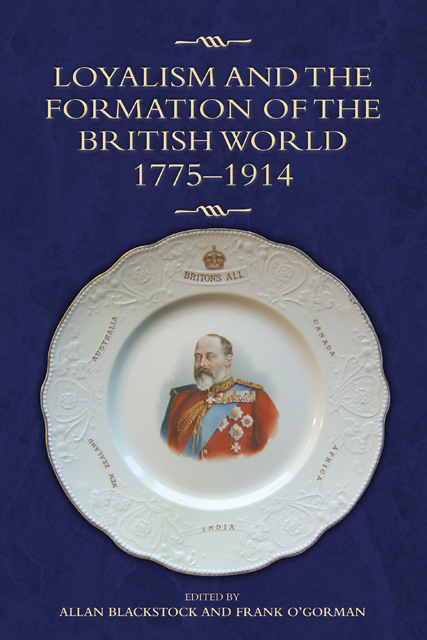Book contents
- Frontmatter
- Contents
- Notes on Contributors
- 1 Loyalism and the British World: Overviews, Themes and Linkages
- 2 Origins and Trajectories of Loyalism in England, 1580–1840
- 3 The ‘Spirit of Loyalty’: Material Culture, Space and the Construction of an English Loyalist Memory, 1790–1840
- 4 Anti-Catholicism and Orange Loyalism in Nineteenth-Century Britain
- 5 Loyalty and the Monarchy in Ireland, c.1660–c.1840
- 6 The Trajectories of Loyalty and Loyalism in Ireland, 1793–1849
- 7 Presbyterians, Loyalty and Orangeism in Nineteenth-Century Ulster
- 8 Unionists and Patriots: James Whiteside, the Irish Bar and the Dilemmas of the Protestant Nation in Victorian Ireland
- 9 Loyalism in British North America in the Age of Revolution, c.1775–1812
- 10 ‘A Colonial Hybrid’: Nineteenth-Century Loyalism as Articulated by the Orange Order in the Maritime Colonies of British North America
- 11 Canadian Catholics, Loyalty, and the British Empire, 1763–1901
- 12 Loyalism in Australasia, 1788–1868
- 13 ‘We love one country, one queen, one flag’: Loyalism in Early Colonial New Zealand, 1840–80
- 14 Clientelism, Community and Collaboration: Loyalism in Nineteenth-Century Colonial India
- Select bibliography
- Index
2 - Origins and Trajectories of Loyalism in England, 1580–1840
Published online by Cambridge University Press: 28 February 2023
- Frontmatter
- Contents
- Notes on Contributors
- 1 Loyalism and the British World: Overviews, Themes and Linkages
- 2 Origins and Trajectories of Loyalism in England, 1580–1840
- 3 The ‘Spirit of Loyalty’: Material Culture, Space and the Construction of an English Loyalist Memory, 1790–1840
- 4 Anti-Catholicism and Orange Loyalism in Nineteenth-Century Britain
- 5 Loyalty and the Monarchy in Ireland, c.1660–c.1840
- 6 The Trajectories of Loyalty and Loyalism in Ireland, 1793–1849
- 7 Presbyterians, Loyalty and Orangeism in Nineteenth-Century Ulster
- 8 Unionists and Patriots: James Whiteside, the Irish Bar and the Dilemmas of the Protestant Nation in Victorian Ireland
- 9 Loyalism in British North America in the Age of Revolution, c.1775–1812
- 10 ‘A Colonial Hybrid’: Nineteenth-Century Loyalism as Articulated by the Orange Order in the Maritime Colonies of British North America
- 11 Canadian Catholics, Loyalty, and the British Empire, 1763–1901
- 12 Loyalism in Australasia, 1788–1868
- 13 ‘We love one country, one queen, one flag’: Loyalism in Early Colonial New Zealand, 1840–80
- 14 Clientelism, Community and Collaboration: Loyalism in Nineteenth-Century Colonial India
- Select bibliography
- Index
Summary
Loyalism is the name usually applied to the burst of counter-revolutionary patriotism which swept across England in the wake of the French Revolution. In recent years, the concept of ‘loyalism’ has undergone considerable expansion. Normally used to describe the phenomenon of the Reeves Associations of 1792–93, it has been stretched to include almost anything of an anti-reformist nature that may have contributed to the avoidance of revolution in England in the 1790s. This essay will seek to extend our understanding of loyalism by outlining not only a viable concept of late eighteenth-century loyalism but also by offering a remodelled narrative of the origins and development of loyalism in early modern English history. Oddly, there has never been an authorised version of its emergence. What follows is an initial sketch of what may be termed the early trajectories of associational loyalism. It neither includes an analysis of loyalist ideology nor a detailed account of loyalist practice and ritual. It pays little attention to the (at times opaque) relationship between the loyalists and the Tory and Whig parties and it says even less about the persons, families and places which from time to time supported loyalism. It does, however, endeavour to trace the history of associational loyalism, which in many ways acts as the agency, catalyst and vehicle for most expressions of loyalism.
The early historiography on loyalism was almost wholly unsympathetic. Until the 1960s little academic research was done and many of the early accounts were hostile. Loyalism was depicted as a reactionary, upper-class conspiracy reacting against the libertarian values of the French Revolution and was therefore dismissed as the ideological arm of Pitt’s terror. With some variations, this interpretation was followed by the writers of influential textbooks such as those by Briggs, Owen and Steven Watson. Specialist studies fitted the same pattern. Indeed, the Loyal Associations were positively hated by E. C. Black who denounced the panic-stricken upper classes in extravagant terms, clinging on to power, ‘discomfited by the new age’. In the 1960s they suffered withering contempt from leftwing writers. For Edward Thompson, loyalism was simply an ugly and repressive response to legitimate demands for political and social reform from men and women of the lower orders. Thompson’s loyalists were upper-class reactionaries who ‘sought to revive and inflame the technique of mob violence … backed by the resources of established authority’.
- Type
- Chapter
- Information
- Publisher: Boydell & BrewerPrint publication year: 2014



